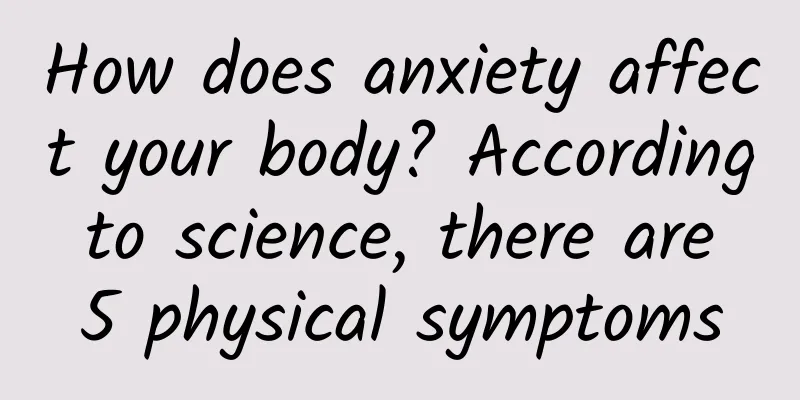How does anxiety affect your body? According to science, there are 5 physical symptoms

|
Many people experience feelings of anxiety at some point in their lives, whether they are triggered by an important exam, a first date, or unexpected bad news. For people with an anxiety disorder, these feelings can turn into recurring, intrusive thoughts or worries that impact daily life. According to the American Psychological Association, anxiety can also be categorized based on physical symptoms. Most of these symptoms are caused by the overproduction of stress hormones, including cortisol, adrenaline, norepinephrine, and vasopressin. These hormones activate the body's fight-or-flight response, which can trigger symptoms such as increased heart rate, sweating, and shortness of breath. 1. Headache Migraines and chronic daily headaches are common among people with anxiety disorders, according to the Anxiety and Depression Association of America, and the most common type of headache is a tension headache, in which sufferers feel like there's a tight band around their head. Headaches are triggered by the release of stress hormones, which constrict blood vessels in the brain. However, it is often difficult to determine which came first, anxiety or headaches. Headaches may be part of the symptoms of anxiety, or they may actually cause anxiety. 2. Cardiovascular symptoms People with anxiety disorders often experience cardiovascular symptoms, such as chest tightness or a racing heartbeat. This is because stress hormones cause blood vessels to constrict, which can lead to high blood pressure and an increased heart rate. Anxiety disorders are also linked to impaired function of the vagus nerve — the body's highway for sending messages between the brain and gut — and reduced heart rate variability (HRV) — the variation in the timing between heartbeats, according to a review published in 2014 in the journal Frontiers in Psychiatry The vagus nerve plays a central role in regulating heart activity: When it doesn't work properly, it causes the heart to not contract effectively. Low HRV, meanwhile, can make individuals more slow to recover from stressors, the review researchers wrote. 3. Digestive system symptoms When a person is anxious, more stress hormones enter their digestive system. This can lead to digestive issues such as bloating, abdominal pain, nausea, and constipation. According to a 2017 review published in the journal Frontiers in Systems Neuroscience, the link between anxiety and visceral hypersensitivity (low visceral pain threshold) may be caused by a combination of genetic factors and early life experiences, with early childhood being a critical period for the development of brain circuits involved in regulating stress and pain. Certain genetic polymorphisms may increase the risk that these brain circuits will not develop properly. When genetically predisposed individuals are exposed to adverse early life experiences, such as trauma or abuse, their pain neural circuits may develop in a way that enhances pain perception and anxiety in adulthood. Stress hormones can also disrupt the balance of gut bacteria, leading to inflammation and other digestive issues. A 2021 review published in the journal Clinical Psychology Review found that people with anxiety disorders tended to have more pro-inflammatory bacteria (such as Enterobacteriaceae and Desulfovibrio) and fewer beneficial bacteria (such as Faecalibacterium). 4. Poor immunity Cortisol, which is overproduced during periods of anxiety, affects the immune system by disrupting the production of infection-fighting white blood cells. Therefore, the continued release of cortisol can lead to an increased chance of infection. 5. Difficulty breathing and dizziness "Rapid, shallow breathing and dizziness are common symptoms of anxiety, which we experience when we anticipate or anticipate that something bad might happen, and the body responds to help us cope with a tense or stressful situation. This creates a fight-or-flight response. The body responds by increasing our breathing so that our lungs pump more oxygen through [it] in case we need to flee. However, this can cause a person to feel short of breath, which can trigger more anxiety or panic," Enrique said. An increased breathing rate may also cause dizziness. When we feel anxious, we start breathing quickly and deeply, which can cause a decrease in the level of carbon dioxide in the blood, leading to nausea, dizziness, or tingling in the hands and feet. Source: Chongqing Tianji Network Co., Ltd. Source: Live Science "How anxiety affects the body: 5 physical symptoms, according to science" Statement: Except for original content and special notes, some pictures are from the Internet. They are not for commercial purposes and are only used as popular science materials. The copyright belongs to the original authors. If there is any infringement, please contact us to delete them. |
<<: What happened to people who took a walk every day? There are so many benefits!
>>: Can blood sampling during a physical examination lead to anemia? Finally figured it out!
Recommend
Stop it! If these parts of your body are too clean, you are harming yourself!
We have been taught since childhood Be hygienic a...
What is the reason for stomach pain in the 60th day of pregnancy?
For pregnant women, they should be particularly c...
Why do I gain weight during ovulation?
Generally, every woman has an ovulation period ev...
Will dysmenorrhea affect fertility?
Menstruation is a sign of female health. Its norm...
What Chinese patent medicine should be taken for damp-heat constitution? Treat the symptoms according to the type of damp-heat
Damp-heat constitution is generally divided into ...
What to do about stretch marks on the buttocks
Stretch marks mainly appear on the abdomen and bu...
My period has not come for more than ten days.
Doctors often tell you that it is normal for mens...
Five things to note when checking for diabetes
I often see some diabetic patients coming to the ...
Causes of bad skin during pregnancy
Pregnancy is something that makes many women feel...
What to do if you have vaginal warts?
Vaginal warts are a common disease that can occur...
How to reduce acrylamide in food
Recently, the Shenzhen Consumer Council randomly ...
Three major symptoms of hyperthyroidism during pregnancy
Women may encounter many medical problems during ...
What is conception day?
The day of conception is actually the day of ovul...
Which department should I go to for breast B-ultrasound
Chest B-ultrasound can include breast B-ultrasoun...
What causes bleeding when women urinate?
Gynecological diseases are very common. As women,...






![[Doctors Talk] Prevention and Treatment of Diabetes Complications: Early Prevention, Relief of Symptoms](/upload/images/67f17b8c65949.webp)


